- Author Jason Gerald gerald@how-what-advice.com.
- Public 2023-12-16 10:50.
- Last modified 2025-01-23 12:04.
Cats can suffer from depression just like humans. This can be caused by various factors, from moving to a new house to losing a loved one. Depression can be very difficult to detect, as changes in behavior in cats are sometimes subtle. However, with careful supervision, you will be able to spot the symptoms of depression in your cat and treat them right away.
Step
Method 1 of 3: Evaluating the Situation
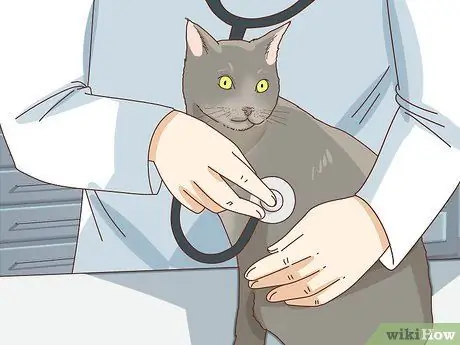
Step 1. Get your cat checked by a veterinarian
If you notice any behavioral changes in your cat, make an appointment with the vet. You need to make sure that there are no medical problems that are depressing your cat that require specific treatment.
- Tell your vet about any changes you notice in your cat, such as changes in appetite, sleep habits, and personality. The vet will perform regular physical exams, listen to the cat's heartbeat, examine its eyes and ears, and take its temperature.
- If needed, the veterinarian may perform blood tests, x-rays, or other tests based on the behavioral changes you mention. Some test results can be seen without taking long, while others take around a few days.
- If there are no medical problems, your cat could be suffering from depression.
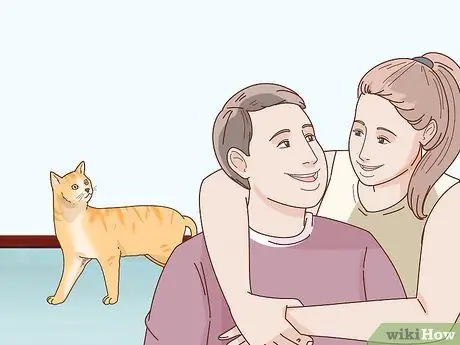
Step 2. Pay attention to the recent changes
Depression in cats is related to a variety of factors. Consider your current situation and find out if any major recent changes have triggered depression in cats.
- Have you recently moved house? Moving house is one of the biggest causes of depression in cats. Most cats have trouble moving from apartment to apartment or house to house and can suffer from temporary depression as they adapt to the moving house process.
- Has there been a death in your home recently? Whether a person or a pet dies, death of course has an impact on the cat. Cats don't understand death in the same way humans do, but they will recognize the absence of the person or animal. This can trigger feelings of depression.
- Have you been getting busy recently? Whether it's work, social life, or love, if you don't spend a lot of time with your cat, it can lead to depression. Cats, especially Siamese breeds, are social animals and will feel depressed if they feel neglected.

Step 3. Pay attention to the seasons of the year
Seasonal Affective Disorder (SAD) is not only suffered by humans. Cats can also be affected by this when the time comes and they will become even more depressed in the winter.
- The length of the day in winter will be shorter. This means that the sun's rays are decreasing. Lack of sun exposure can lead to depression in cats, thereby changing their behavior. If your cat's personality seems to change with the seasons, he may be experiencing seasonal depression.
- Sunlight affects melatonin and serotonin levels. This can cause fatigue, anxiety, and sadness in both humans and cats. Stray cats are especially susceptible to depression in winter because of their time spent outdoors.
Method 2 of 3: Looking for Depression Symptoms
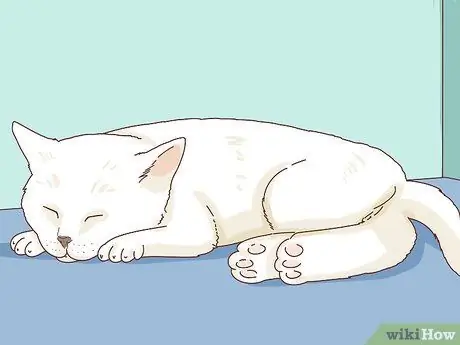
Step 1. Pay attention to the cat's sleeping habits
Cats love to sleep. In fact, he can sleep for approximately 16 hours a day. However, if your cat seems to be sleeping more than usual, this could be a sign of depression.
- Since cats sleep a lot, it can be very difficult to gauge when they are oversleeping. However, you should know when the cat will wake up and when it will sleep. Use this time as a guide when monitoring his sleep habits.
- If you notice that your cat wakes up to greet you in the morning and suddenly falls asleep in the kitchen, this could be a sign that she is depressed. If your cat always wakes up when you come home from work and instead sleeps on the couch, pay attention to this as well.
- Watch for reduced energy in the cat. When a cat isn't asleep, does it look lethargic? Some cats are naturally lazy, but if your cat who was originally cheerful and energetic suddenly lies down all day, this could also be a symptom of depression.
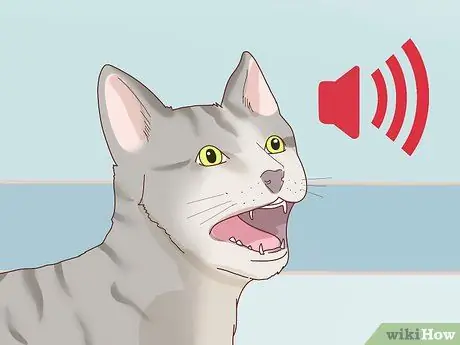
Step 2. Listen for more frequent cat noises
Cats can make a variety of sounds, from hissing to purring to meowing. If you notice that your cat is meowing more often than usual, this could be related to depression.
- A depressed cat will cry, roar, or hiss in response to something or meow for no reason throughout the day. He may be trying to tell you that something is wrong.
- As with sleep, how often a cat meows so called unusual varies from cat to cat and you're the best at judging what's normal for your pet. If your cat is usually chatty, meows frequently to announce her presence, or is seeking attention, you don't have to worry about this cat's vocalizations. However, if he's normally quiet and suddenly starts to wake you up at night by meowing, he may be trying to communicate his unhappiness.
- Making excessive noise is often the result of the death of a close friend, be it an animal or a human. The cat may meow to try to get the lost friend to find it.
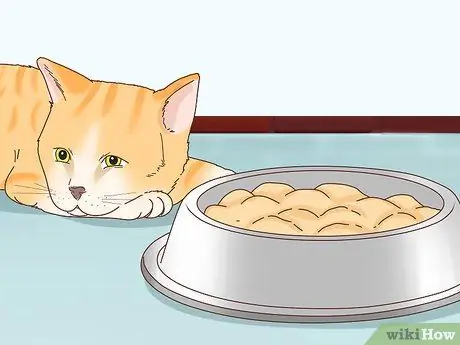
Step 3. Pay attention to the cat's diet
A depressed cat may be overeating or under-eating because they are feeling sad. Pay attention to how much food the cat eats.
- Loss of appetite is an important factor in depression in humans and animals. Your cat may not be interested in food and you may notice that it doesn't eat when it's time and that any dry or wet food you left is left untouched. Weight loss can be caused by changes in appetite.
- On the other hand, some cats will overeat when depressed. Although rare, it may be of interest. If you notice your cat wants to eat more, especially until she gains weight, this could be a sign of depression.
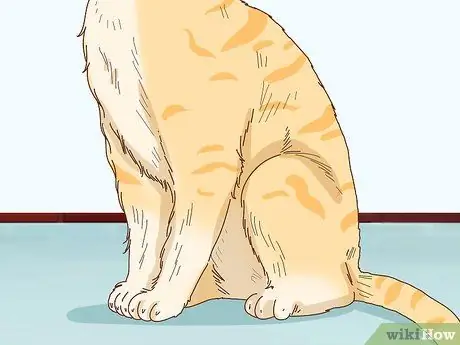
Step 4. Check the cat's fur
When you're depressed, your cat may stop grooming itself or overdo it. This can be seen with the naked eye.
- If your cat's coat looks dull or lackluster, it may not be grooming itself. You can notice when a cat is not taking care of itself. For example, if your cat often cleans himself in the middle of the living room after eating, and he suddenly stops doing so, this could be a sign of depression.
- Other cats may over-groom themselves to limit the anxiety associated with depression in cats. You'll likely see your cat licking itself more often over a longer period of time. The fur will also fall out in some parts due to too much grooming.
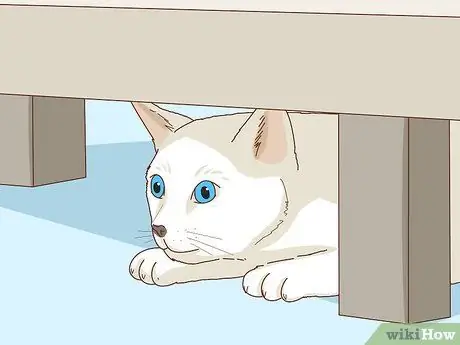
Step 5. Record how often your cat hides
Cats are social animals, but sometimes they like to be alone. It's not uncommon for a cat to have a favorite hiding place, like a drawer or cupboard, but hiding too much can also be a sign of depression.
- When depressed, cats may hide in secluded places. For example, instead of being alone in a closet, he may hide in a corner until he can't be seen.
- Again, only you can gauge what is normal for your cat. Some cats hide more often than others, but if you're used to seeing your cat spending time in the living room in the afternoon and suddenly disappearing, this could be a sign of depression.
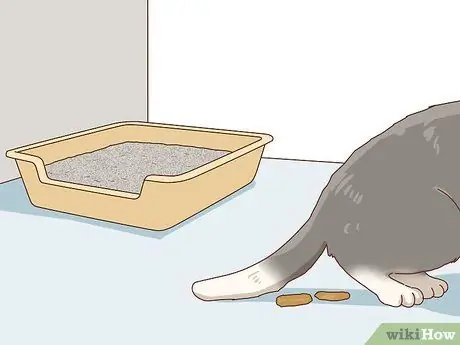
Step 6. Watch for urinary problems in cats
Problems urinating related to stress which is a symptom of depression in cats.
- Understand the difference between urine marking and urination. Urine marking is a form of marking territory and is not usually associated with depression in cats. Urine is usually found on vertical surfaces, tends to have a strong odor, and is usually carried by male cats. If your cat does this, it usually feels like its territory is being threatened and not caused by depression. However, tension between cats and other pets can cause anxiety, stress, and depression. Make sure you handle all territorial disputes before they cause mental health problems.
- If you find urine or feces around the house, this could be a sign of depression in your cat. Cats may urinate because they don't like the size, shape, or type of litter or because the litter box is dirty. If the litter box is clean, and you haven't made any changes to the litter box, this peeing behavior could be related to depression.
Method 3 of 3: Fighting Depression
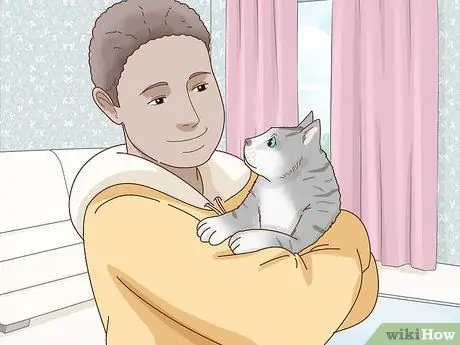
Step 1. Give the cat enough attention
Depression in cats can be caused by a lack of attention. Make sure you give your cat the love she needs to feel happy and safe.
- Cats are social animals, but tend to be more independent. Your cat will show you when it needs attention, and it's best to let it come to you. If your cat comes up to you and is very friendly, like brushing his paw or nuzzling you, he needs attention. While it's impossible to stop everything you do to fulfill your cat's wishes, you should at least give them a light pat and a gentle stroke to let them know you appreciate them.
- Cats love stimulating activities, so make sure you play with your cat. 15 or 20 minutes a day is a good amount of time. Cats love toys like yarn and animal-shaped foam toys that you can throw at them so they can chase them. However, never abuse the cat. Some cat owners will wrestle with their pet with their hands, but this can make the cat feel scared and act aggressively.
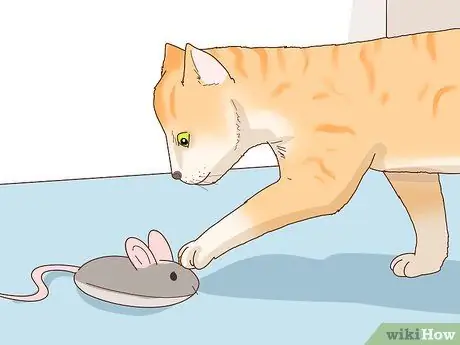
Step 2. Make sure your cat has entertainment when you're out of the house
If you've just taken on a busy job, and you believe your cat's depression is a response to this change, try to make her happy while you're gone. There are many ways to ensure that your cat is entertained in your absence.
- Open the curtains during the day, especially if you live in a remote area. Make sure there is a table, cupboard, or other footing for the cat to climb near the window. Cats love to look outdoors, be out in the sun, and have entertainment while you're away.
- Some companies sell DVDs and other electronic media that you can tune on your TV while away. These films provide stimulants that cats like, such as birds, mice, and other cats. However, be careful because the cat can jump and hit the TV. Make sure your TV is safe and won't fall and damage at the cat's curiosity.
- Many toys are specially designed for cats to enjoy while you're away, such as catnip-embroidered bird and mouse toys. There are also puzzle games where toys or food are placed in closed containers. Your cat will have to figure out a way to open the sealed container to get the reward and this will keep him entertained while you're away. However, be careful. Some toys have warnings advising against leaving your cat alone with the toy. Make sure you choose toys that are safe to leave while you're away.
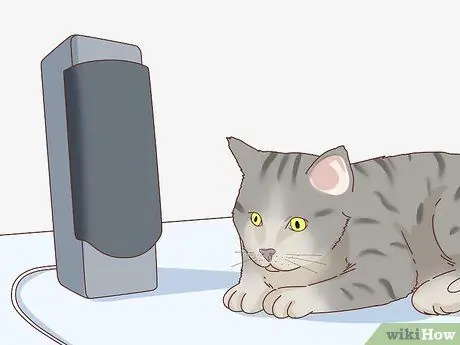
Step 3. Try light therapy
If your cat's depression is related to seasonal changes, light therapy can help reduce depression in winter.
- Buy a UV-stimulating lamp and keep it on for a few hours a day when your cat is nearby. Such light is commonly sold in greenhouses because most people buy it to grow plants indoors.
- Sol Box is a vet-recommended UV light brand because it is made especially for cats. You can buy it at an internet retailer called Pawsitive Lighting. This lamp creates a bright white light and the manufacturer recommends giving your cat 30 minutes of light every day in winter.
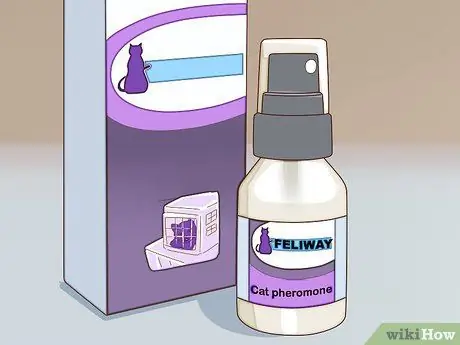
Step 4. Try synthetic pheromones
Your veterinarian can recommend a synthetic pheromone brand made to promote feelings of relaxation and happiness in your cat.
Feliway spray is one of the best-known synthetic pheromones, and you should be able to buy supplies at your vet. Use as directed and check with your veterinarian if you have any questions or concerns about Feliway spray
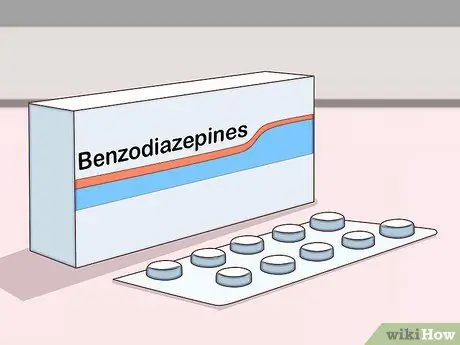
Step 5. Consider medications
Medication is generally considered a last resort for treating depression in cats because of the side effects and the fact that cats have a hard time taking medication.
- There are four types of drugs used to treat depression and other behavioral problems in cats: benzodiazepines (BZ), monoamine oxidase inhibitors (MAOIs), tricyclic antidepressants (TCAs), and selective serotonin reuptake inhibitors (SSRIs). Often, if your cat is depressed, your vet will recommend an SSRI or an MAOI.
- Depending on the drug, side effects can vary. Some side effects can be quite serious. For example, some MAOIs can cause a life-threatening reaction if your cat accidentally eats cheese while on medication. Make sure you understand all the side effects before giving your cat any medication. Ask your vet about all the side effects, and which side effects require immediate medical attention.
- Cats are notoriously difficult to take medication. Most veterinarians only prescribe medication as a last resort. If your vet recommends a medication, make sure you know the rules for administering the medication, dosage, and proper storage. If you're confused or worried about something, don't hesitate to call your vet and ask.
Tips
- Always consult a veterinarian when you notice a change in behavior in your cat. Don't assume that your cat is depressed because certain symptoms, such as loss of appetite, are associated with various illnesses. If your cat has a serious health problem, early prevention is very important.
- If you believe your cat is lonely because of the loss of another pet, you might consider adopting another cat or dog. Of course, this is an emotionally difficult decision, but some cats are more social than others. If your cat seems to prefer company, consider taking care of another pet.






